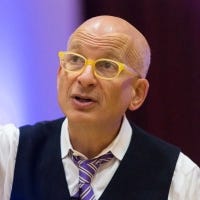As a follow-up to my first post today, here is a short video I did in 2010 on the difference between a graduate student and a graduate scholar?
By the way, the auto-generated subtitles are accurate, but the subtitles in the video itself are not.
Wednesday, August 07, 2019
Are you committed to learning?
This is off-topic, so feel free to stop reading. However, if you're interested in learning, keep reading.
Last month, I wrote about a section in Seth Godin's book Stop Stealing Dreams: What is School Good For? The book is available online for free in full-text. That post is The Standardized Mass Contract. With the outdoors beckoning, I am slowly making my way through the rest of the book. As an instructor-teacher-professor, my mind keeps being drawn back to this section:
In section 44, Godin writes:
In the movie, Hidden Figures, one of the characters implores his team to "look beyond." To look beyond, a student needs to be committed to learning, questioning, exploring...and not to obtaining a specific grade. Going for the grade is easy. Looking beyond is where the opportunities are.
If you're heading to school, to a conference, or to a workshop, are you committed? Will you look beyond?
Last month, I wrote about a section in Seth Godin's book Stop Stealing Dreams: What is School Good For? The book is available online for free in full-text. That post is The Standardized Mass Contract. With the outdoors beckoning, I am slowly making my way through the rest of the book. As an instructor-teacher-professor, my mind keeps being drawn back to this section:
In less than three weeks, the fall semester classes will begin on many college campuses. Students will walk into classrooms expected to be educated. They will sit and expect that the information delivered will make them more employable after 2-4 years. There are many reasons why students head off to college. I wonder how many are fully committed to the educational process, which includes a high level of commitment inside and outside the classroom. I also wonder how many come expecting - and wanting - their thoughts and world-view to be challenged. If your thoughts aren't being challenged, are you learning anything new?27. The decision
We don’t ask students to decide to participate. We assume the contract of adhesion, and relentlessly put information in front of them, with homework to do and tests to take.
Entirely skipped: commitment. Do you want to learn this? Will you decide to become good at this?
The universal truth is beyond question — the only people who excel are those who have decided to do so. Great doctors or speakers or skiers or writers or musicians are great because somewhere along the way, they made the choice.
Why have we completely denied the importance of this choice?
In section 44, Godin writes:
Teaching is no longer about delivering facts that are unavailable in any other format.You may need to read that twice. In most classes, students are expected to learn how others have thought about that subject. They need to get their thinking in line with everyone else on that topic. However, what we need is to have students committed to learning what others think and then taking the next step and thinking radically about the topic themselves. They need to question the topic with questions grounded in what is known, with an eye towards what's next. Imagine a student who could ask what would happen if "X" occurred, and did so with the knowledge of A-W.
In the movie, Hidden Figures, one of the characters implores his team to "look beyond." To look beyond, a student needs to be committed to learning, questioning, exploring...and not to obtaining a specific grade. Going for the grade is easy. Looking beyond is where the opportunities are.
If you're heading to school, to a conference, or to a workshop, are you committed? Will you look beyond?
Tuesday, August 06, 2019
Secretly Public Domain: U.S. Copyright History 1924-63
 Last week, Boing Boing published an article entitled, "Data-mining reveals that 80% of books published 1924-63 never had their copyrights renewed and are now in the public domain." What? According to Leonard Richardson:
Last week, Boing Boing published an article entitled, "Data-mining reveals that 80% of books published 1924-63 never had their copyrights renewed and are now in the public domain." What? According to Leonard Richardson:A recent NYPL project has paid for the already-digitized registration records to be marked up as XML. (I was not involved, BTW, apart from saying "yes, this would work" four years ago.) Now for anything that's unambiguously a "book", we have a parseable record of its pre-1964 interactions with the Copyright Office: the initial registration and any potential renewal.
The two datasets are in different formats, but a little elbow grease will mesh them up. It turns out that eighty percent of 1924-1963 books never had their copyright renewed. More importantly, with a couple caveats about foreign publication and such, we now know which 80%.
Of course, the details matter and NYPL provides those in its own post, U.S. Copyright History 1923–1964. I'll note that there is more work to be done to ensure that the data is correct, including harmonizing the variations of an author's name. For now, read the long post from the NYPL and begin to envision how this will change your use of pre-1963 materials!
Subscribe to:
Posts (Atom)
